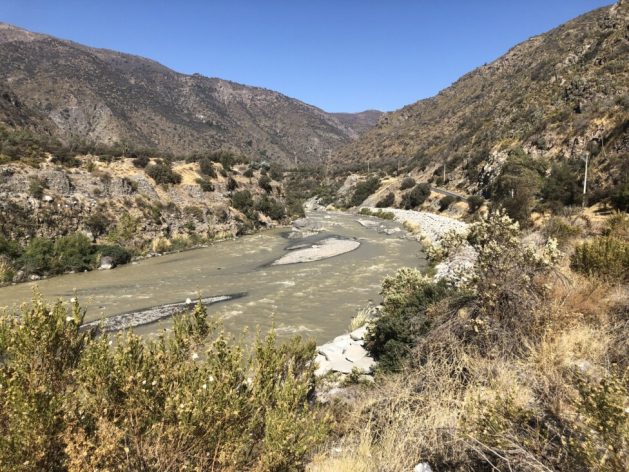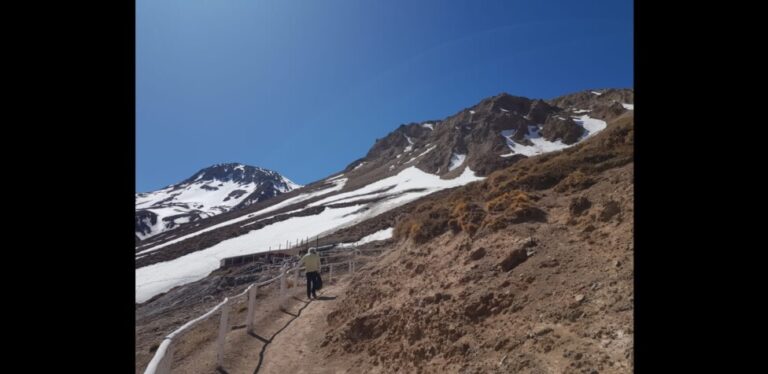Chiles Water Vulnerability Requires Watershed and Water Management

SANTIAGO, Apr 19 (IPS) - Good management of the 101 hydrographic basins which run from the Andes mountain range to the Pacific Ocean is key to solving the severe water crisis that threatens the people of Chile and their main productive activities.
This vulnerability extends to the economy. Since 1990 Chile has gradually become wealthier, but along with the growth in GDP, water consumption has also expanded.
Roberto Pizarro, a professor of hydrology at the universities of Chile and Talca, told IPS that this "is an unsustainable equation from the point of view of hydrological engineering because water is a finite resource."
According to Pizarro, “there are threats hanging over this process. From a production point of view, Chile's GDP depends to a large extent on water. According to figures from the presidential delegation of water resources of the second administration of Michelle Bachelet (2014-2018), at least 60 percent of our GDP depends on water.”
This South American country, the longest and narrowest in the world, with a population of 19.6 million people, depends on the production and export of copper, wood, agricultural and sea products, as well as a growing tourism industry. All of which require large quantities of water.
And water is increasingly scarce due to overuse, excessive granting of water rights by the government, and climate change that has led to a decline in rainfall and snow.
To make matters worse, since 1981, during the dictatorship of Augusto Pinochet (1973-1990), water use rights have been privatized in perpetuity, separated from land tenure, and can even be traded or sold. This makes it difficult for the branches of government to control water and is a key point in the current debate on constitutional reform in Chile.
Ecologist Sara Larraín maintains that the water crisis “has its origin in the historical overexploitation of surface and groundwater by the productive sectors and in the generalized degradation of the basins by mining, agro-industry and hydroelectric generation. And the wood pulp industry further compounded the problem.”
Larraín, executive director of the Sustainable Chile organization, adds that the crisis was aggravated by a drought that has lasted for more than a decade.
"There is a drastic decline in rainfall (of 25 percent) as a result of climate change, reduction of the snow surface and increase in temperatures that leads to greater evaporation," she told IPS.

First-hand witnesses
The main hydrographic basin of the 101 that hold the surface and underground water in Chile’s 756,102 square kilometers of territory is the Maipo River basin, since it supplies the Greater Santiago region, home to 7.1 million people.
In this basin, in the town of El Volcán, part of the San José de Maipo municipality on the outskirts of Santiago, on the eastern border with Argentina, lives Francisco Rojo, 62, a wrangler of pack animals at heart, who farms and also works in a small mine.
“The (inactive) San José volcano has no snow on it anymore, no more glaciers. In the 1990s I worked near the sluices of the Volcán water intake and there was a surplus of over 40 meters of water. In 2003 the snow was 12 to 14 meters high. Today it’s barely two meters high,” Rojo told IPS.
“The climate has been changing. It does not rain or snow, but the temperatures drop. The mornings and evenings are freezing and in the daytime it’s hot,” he added.
Rojo gets his water supply from a nearby spring. And using hoses, he is responsible for distributing water to 22 families, only for consumption, not for irrigation.
“We cut off the water at night so there is enough in the tanks the next day. Eight years ago we had a surplus of water. Now we have had to reduce the size of the hoses from two inches to one inch,” he explained.
“We were used to a meter of snow. Now I'm glad when 40 centimeters fall. It rarely rains and the rains are always late,” he said, describing another clear effect of climate change.
Agronomist Rodrigo Riveros, manager of one of the water monitoring boards for the Aconcagua River in the Valparaíso region in central Chile, told IPS that the historical average at the Chacabuquito rainfall station, at the headwaters of the river, is 40 or 50 cubic meters, a level that has never been surpassed in 12 years.
"This decade we have half the water we had in the previous decade," he said.
“Farmers are seeing their production decline and are losing arable land. Small farmers are hit harder because they have a more difficult time surviving the disaster. Large farmers can dig wells or apply for loans, but small farmers put everything on the line during the growing season,” he said.
Large, medium and small users participate in the Aconcagua water board, 80 percent of whom are small farmers with less than 10 hectares. But they coexist with large water users such as the Anglo American mining company, the state-owned copper company Codelco and Esval, the region's sanitation and drinking water distribution company.
“The decrease in rainfall is the main problem,” said Riveros..”The level of snow dropped a lot because the snow line rose – the altitude where it starts to snow. And the heavy rains increased flooding. Warm rain also falls in October or November (in the southern hemisphere springtime), melting the snow, and the water flows violently, carrying a lot of sediment and damaging infrastructure.
“It used to snow a lot more. Now three meters fall and we celebrate. In that same place, 10 meters used to fall, and the snow would pile up as a kind of reserve, even until the following year,” he said.
In Chile, the water boards were created by the Water Code and bring together natural and legal persons together with user associations. Their purpose is the administration, distribution, use and conservation of riverbeds and the surrounding water basins.
Enormous economic impact
Larraín cited figures from the National Emergency Office of the Ministry of the Interior and Public Security and from regional governments that reveal that State spending on renting tanker trucks in the last decade (2010-2020) was equivalent to 277.5 million dollars in 196 of the total of 346 municipalities that depend on this method of providing drinking water.
"The population served in its essential needs is approximately half a million people, almost all of them from the rural sector and shantytowns and slums," said Larraín.
According to the environmentalist, Chile has not taken actions to mitigate the drought.
“Although the challenge is structural and requires a substantial change in water management and the protection of sources, the official discourse insists on the construction of dams, canals and aqueducts, even though the reservoirs are not filled due to lack of rainfall and there is no availability in the regions from which water is to be extracted and diverted,” she said.
She added that the mining industry is advancing in desalination to reduce its dependence on the water basins, "although there is still no specific regulation for the industry, which would prevent the impacts of seawater suction and brine deposits."
Larraín acknowledged that the last two governments established sectoral and inter-ministerial water boards, but said that coordination between users and State entities did not improve, nor did it improve among government agencies themselves.
"Each sector faces the shortage on its own terms and we lack a national plan for water security, even though this is the biggest problem Chile faces in the context of the impacts of climate change," the environmental expert asserted.
Government action
The Ministry of the Environment admits that "there is still an important debt in terms of access to drinking water and sanitation for the rural population."
“There is also a lack of governance that would make it possible to integrate the different stakeholders in each area for them to take part in water decisions and planning,” the ministry responded to questions from IPS.
In addition, it recognized that it is necessary to "continue to advance in integrated planning instruments that coordinate public and private initiatives.
"We coordinated the Inter-Ministerial Committee for a Just Water Transition which has the mandate to outline a short, medium and long-term roadmap in this matter, which is such a major priority for the country," the ministry stated.
The committee, it explained, "assumed the challenge of the water crisis and worked on the coordination of immediate actions, which make it possible to face the risk of water and energy rationing, the need for rural drinking water, water for small-scale agriculture and productive activities, as well as ecosystem preservation.”
The ministry also reported that it is drafting regulatory frameworks to authorize and promote the efficiency of water use and reuse.
Furthermore, it stressed that the Framework Law on Climate Change, passed in June 2022, created Strategic Plans for Water Resources in Basins to "identify problems related to water resources and propose actions to address the effects of climate change."
The government of Gabriel Boric, in office since March 2022, is also promoting a law on the use of gray water for agricultural irrigation, with a focus on small-scale agriculture and the installation of 16 Pilot Basin Councils to achieve, with the participation and coordination of the different stakeholders, “an integrated management of water resources.”
© Inter Press Service (2023) — All Rights Reserved. Original source: Inter Press Service
Where next?
Browse related news topics:
Read the latest news stories:
- Greenland: A Brief Chronicle of a US Historical Interest Tuesday, April 01, 2025
- UN Staff Put on Alert -- as US Visa Holders Face Threats and Deportation Tuesday, April 01, 2025
- Myanmar earthquake latest: Entire communities flattened, aid teams say Tuesday, April 01, 2025
- Forest Guards Risking Their Lives To Keep Malawi’s Forests Standing Monday, March 31, 2025
- Global Climate Action Progressing, but Speed and Scale Still Lacking Monday, March 31, 2025
- ‘Student Protests Have Sparked Solidarity, Empathy and a Renewed Belief in Collective Action’ Monday, March 31, 2025
- Southeast Asia’s Economies Can Gain Most by Packaging Ambitious Reforms Monday, March 31, 2025
- Myanmar earthquake tragedy ‘compounds already dire crisis’ Monday, March 31, 2025
- Gaza: UN relief chief demands ‘answers and justice’ following killings of first responders Monday, March 31, 2025
- Myanmar earthquake: Search and rescue efforts continue in race against time Sunday, March 30, 2025
Learn more about the related issues: